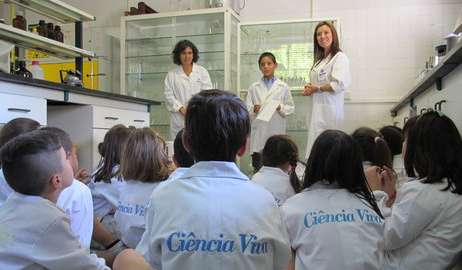IPMA gets back fifty of the first cycle students in their laboratories
 2013-08-07 (IPMA)
2013-08-07 (IPMA)
On Friday 2 October, the PEI received two classes of the 3rd year of the first cycle (EB EB Caselas and José Salvado Sampaio) within the School Life Science in Biological Sampling Laboratory and Chemical Oceanography Laboratory .
In Biological Sampling Laboratory children learned the differences between the bony fish (sardines, mackerel) and cartilaginous fish (sharks and rays). Were able to identify males and females of each species and "saw" with his own hands, the heart, the stomach and the liver of the fish. In Chemical Oceanography Laboratory have learned how to determine the salinity in the water samples and how to detect suspended solids.
During the activities the researchers, able to attend and participate in the enthusiasm of children and thus contribute to their training.

